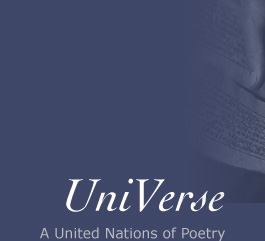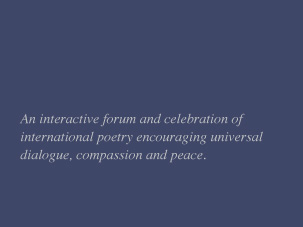| |
 |
 |
 |
In Memoriam
Mahmoud Darwish (13 March 1941 – 9 August 2008), Palestine’s most beloved poet, passed away on August 9, 2008, far too early for all who knew and read him. His humanity was so deep and probing that he wrote poems that were political and mystical, accessible and highly original, beautiful and searing. For his fellow Palestinians, his poems are a homeland. For all of his readers, they are a guide into a deeper, more living humanity. He is truly missed and daily thanked—for his courage, his spirit and his living body of work.
He is remembered by his friend and translator, Fady Joudah, who wrote a personal eulogy, published in The Kenyon Review.
He is remembered by fellow Palestinian poet, Ibstisam Barakat.
Mahmoud Darwish’s poems sprung from a life lived with open alertness. These poems were written by near the end of his life and translated by Fady Joudah in The Butterfly’s Burden, which won the prestigious Banipal Translation Prize. They are reprinted here with permission from Copper Canyon Press. |
 |
 |
English
version
We Walk on the Bridge
You’re afflicted, like me, with a bird’s journey
and this happens in the afternoon,
when you say: Take me to the river
you foreign man, to the river take me
my road upon your banks is long
And we listen to what pedestrians say
on the bridge:
“I have other things to do,”
“I have a place on the ship”
“I have a share in life”
“And as for me,
I must catch the subway
I am late for memories
and for the saxophone lesson,
and my night is little”
We listen to what hidden longing for a mysterious street
is in us: I have my life over there
my life that caravans made then went on their way,
and here I have my life as my bread’s worth
and my questions about a destiny a passing present
tortures, and I have a beautiful chaotic tomorrow
Echo for echo, who of us said those words, me
or the foreign woman? No one can
return to another. Eternity performs
its manual chores out of our lives then thrives . . .
So let love be a kind of fate, and let
fate be a kind of love. How strange
of those who know love to still love! because
love might tire in us from waiting and fall ill,
but it doesn’t say
Our tomorrow has enough time, enough
for us to walk on the bridge for ten more minutes,
we might change soon and forget the features
of our third (death), forget the way to the house
near the sky that has often failed us,
so take me to the river, foreign woman,
we might change soon. And the impossible
might happen
As in writing, the necessary comes
on time, a feminine moon to fill the poem’s
emptiness. Do not leave me completely, and do not
take me completely. Put the right time
in the right place. You are the means and the guide
A real country, not a metaphor, your arms
around me . . . over there by the holy book
or right here. Who of us said: Language
might preserve the land from the plight
of absence if poetry wins? Who
of us said: I will forget, and forgive the heart
more than one mistake, the longer
this departure takes . . .
|
 |
 |
| The Stranger Stumbles on Himslef in the Stranger |
English |
 |
|
 |
|
English
version
The Stranger Stumbles on Himslef in the Stranger
We are one in two /
There’s no name for us, woman, when the stranger
stumbles on himself in the stranger. Of our
garden behind us we have the force of shadow. So show
what you want of your night’s land, and conceal
what you want. We came in a hurry from the twilight
of two places at one time, and searched together
for our addresses: Go behind your shadow,
east of the Song of Songs, a shepherd of sand grouse,
you’ll find a star dwelling in its death, then climb a neglected
mountain and you’ll find my yesterday completing its cycle in my
tomorrow.
You’ll find where we were and where we’ll be together,
we are one in two /
Go to the sea then, man, west of your book,
and dive lightly, lightly as if you were carrying
yourself at birth in two waves,
you’ll find a forest of water grass and a green sky
of water, then dive lightly
lightly as if you were nothing in anything,
and you’ll find us together . . .
we are one in two /
We need to see how we were here, you
stranger, as two shadows opening and closing on what
has been shaped of our shape: a body disappearing then reappearing
in a body disappearing in the mystery of the eternal
duality. We need to return to being two
to embrace each other more. There’s no name for us, woman,
when the stranger stumbles on himself in the stranger!
|
 |
 |
English
version
Wedding Song
And I moved into you, as astronomers move
from one planet to another. My soul looks upon
my body through your ten fingers.
Take me to you, dash off with the dove to
the remoteness of cooing on your two sides: expanse
and echo. And let the horses run after me
in vain. Because I do not, yet, see my image
in its water . . . I see no one
I see no one, I do not see you. What
have you done with my freedom? Who am I
behind the city wall? No mother kneads my long
hair with her eternal henna, and no sister
braids it. Who am I outside the wall between
neutral fields and an ashen sky. Be
my mother in the stranger’s land. And take me
gently to who I become tomorrow
Who do I become tomorrow? Will I be born
out of your rib a woman without worry except to adorn
your life. Or will I cry over there on a rock
that used to guide my clouds to your water well?
Take me to the end
of the earth before morning rises on a moon that used
to cry blood in bed, and take me gently
as a star takes the dreamers in vain
And in vain, I look behind Moab’s mountains,
since no wind brings back the bride’s dress. I love you
but my heart resonates with echo’s return and longs
for another iris. Is there a sorrow more
confusing than a woman’s happiness
on her wedding night? And I love you no matter how often I remember
my yesterday, no matter how often I remember that I forget
the echo in echo
Echo in echo, and I moved into you
as a name moves from one creature to another.
We were two strangers in two faraway lands a while ago,
so what will I be tomorrow when I become
two? What have you done with my freedom? Whenever
my fear of you mounts I rush into you,
my beloved stranger, since my ardent desire
is my only credit. So be a kind fox in my vineyard
and stare with the green of your eye into my ache. I
won’t return to my name and my wilderness, never
never
never.
|
 |
 |
English
version
While Waiting
While waiting, I become obsessed with observing
the many possibilities: maybe she forgot her small
suitcase on the train, and my address got lost
and her mobile phone got lost, so she lost her appetite
and said: No share of the light drizzle for him /
Or maybe she got busy with an urgent matter or a journey
to the south to visit the sun, and called
but didn’t find me in the morning, because
I had gone to buy some gardenia for our evening
and two bottles of wine /
Or maybe she was in dispute with her ex-husband
over matters of memory, and she swore not to see
another man who might threaten her with making memories /
Or maybe she crashed into a taxi on the way
to see me, which extinguished some planets in her galaxy.
And she is still being treated with tranquilizers and sleep /
Or maybe she looked in the mirror before going out
of herself, felt two large pears
making waves on her silk, then sighed and hesitated:
Does anyone else other than myself deserve my womanhood /
Or maybe she ran, by coincidence, into an old
love she hadn’t healed from, and joined him for dinner /
Or maybe she died,
because death loves suddenly, like me,
and death, like me, doesn’t love waiting
|
 |
 |
| Forgotten As If You Never Were |
English |
 |
|
 |
|
English
version
Forgotten As If You Never Were
Forgotten, as if you never were.
Like a bird’s violent death
like an abandoned church you’ll be forgotten,
like a passing love
and a rose in the night . . . forgotten
I am for the road . . . There are those whose footsteps preceded mine
those whose vision dictated mine. There are those
who scattered speech on their accord to enter the story
or to illuminate to others who will follow them
a lyrical trace . . . and a speculation
Forgotten, as if you never were
a person, or a text . . . forgotten
I walk guided by insight, I might
give the story a biographical narrative. Vocabulary
governs me and I govern it. I am its shape
and it is the free transfiguration. But what I’d say has already been said.
A passing tomorrow precedes me. I am the king of echo.
My only throne is the margin. And the road
is the way. Perhaps the forefathers forgot to describe
something, I might nudge in it a memory and a sense
Forgotten, as if you never were
news, or a trace . . . forgotten
I am for the road . . . There are those whose footsteps
walk upon mine, those who will follow me to my vision.
Those who will recite eulogies to the gardens of exile,
in front of the house, free of worshipping yesterday,
free of my metonymy and my language, and only then
will I testify that I’m alive
and free
when I’m forgotten!
|
 |
 |
English
version
If I Were Another
If I were another on the road, I would not have looked
back, I would have said what one traveler said
to another: Stranger! awaken
the guitar more! Delay our tomorrow so our road
may extend and space may widen for us, and we may get rescued
from our story together: you are so much yourself . . . and I am
so much other than myself right here before you!
If I were another I would have belonged to the road,
neither you nor I would return. Awaken the guitar
and we might sense the unknown and the route that tempts
the traveler to test gravity. I am only
my steps, and you are both my compass and my chasm.
If I were another on the road, I would have
hidden my emotions in the suitcase, so my poem
would be of water, diaphanous, white,
abstract, and lightweight . . . stronger than memory,
and weaker than dewdrops, and I would have said:
My identity is this expanse!
If I were another on the road, I would have said
to the guitar: Teach me an extra string!
Because the house is farther, and the road to it prettier—
that’s what my new song would say. Whenever
the road lengthens the meaning renews, and I become two
on this road: I . . . and another!
|
 |
 |
English
version
Like a Mysterious Incident
In Pablo Neruda’s home, on the Pacific
coast, I remembered Yannis Ritsos.
Athens was welcoming those who had come from the sea,
in an amphitheater illuminated with Ritsos’s scream:
“O Palestine,
name of the soil,
and name of the sky,
you will be victorious . . .”
And he embraced me, then introduced me with a victory sign:
“This is my brother.”
So I felt that I had won, and that I had been broken
like a diamond, that nothing but light remained of me /
In a cozy restaurant, we exchanged some affection
about our two old countries, and some memories about
tomorrow: Ancient Athens was more beautiful.
As for Yabous, it cannot take more. The general
has borrowed a prophet’s mask to cry and steal
the victims’ tears: “My dear enemy!
I killed you unintentionally, my dear enemy,
because you bothered my tank” /
Ritsos said: But Sparta broke
in the rise of the Athenian imagination. Truth
and justice are twin brothers that win together. My brother
in poem! poetry has a bridge over
yesterday and tomorrow. The tired fishermen might get together
with those who are exiting mythology.
And together they might have some wine.
I said: What is poetry . . . what is poetry in a nutshell?
He said: It is the mysterious incident, poetry,
my friend, is that inexplicable longing
that makes a thing into a specter, and
makes a specter into a thing. Yet it also might explain
our need to share public beauty . . . /
No sea in his house in ancient Athens,
where the goddesses were managing life’s matters
alongside the kind humans, and where Electra the youthful
summons Electra the old and asks her: Are you
really me?
And no night in his narrow ascetic home
above roofs that overlook the metal forest.
His paintings like the poems are watercolor, and on the floor
of his guest room books were paved like chosen pebbles.
He said to me: When poetry is obstinate I sketch
a few traps on the rocks to hunt the grouse.
I said: From where does the sea come
to your voice, when the sea is already preoccupied, my friend?
He said: From the direction of memories, even though
“I don’t remember that I was once young.”
I was born to two enemy brothers:
my prison and my ailment.
And where did you find childhood then, I asked?
In my sentimental interior. I am the child
and the elderly. My child teaches my elderly metaphor.
And my elderly teaches my child contemplation in my exterior.
My exterior is my interior
whenever my prison becomes narrow I spread into everything,
and my language widens as a pearl that lights up
each time night is on patrol /
And I said: I learned a lot from you. I learned
how to train myself to love
life and how to row in the white
Mediterranean looking for the way and for home or
for the duality of way and home /
He didn’t care for the compliment. He offered me coffee.
Then said: Your Odysseus will come back safe,
he’ll come back . . . /
In Pablo Neruda’s home, on the Pacific
coast, I remembered Yannis Ritsos
at his house. He was entering at that time
one of his myths, saying to one of the goddesses:
If there must be a journey, then let it be
an eternal one!
|
 |
 |
|
 |
|





